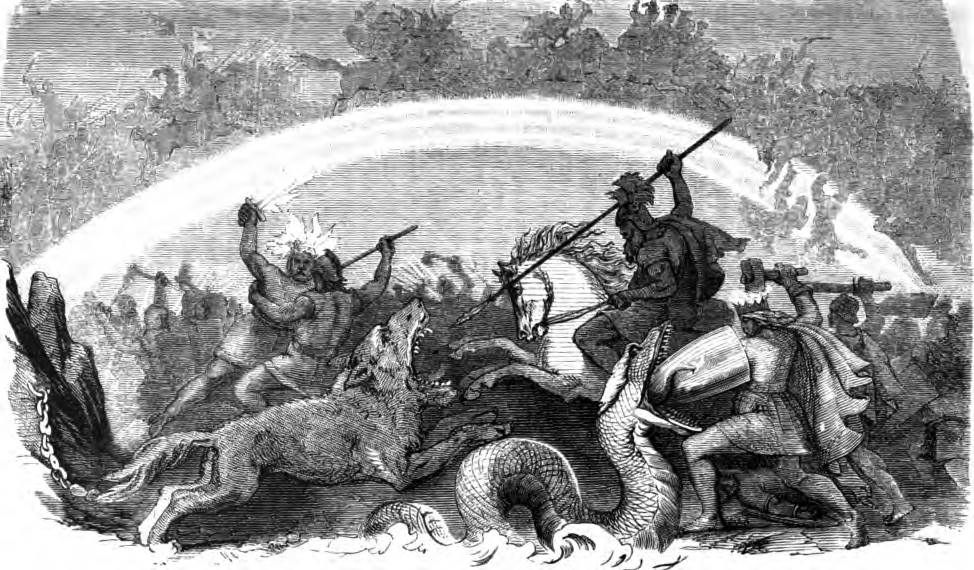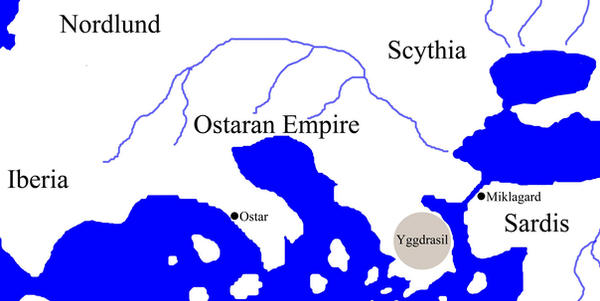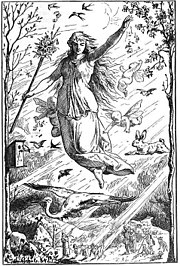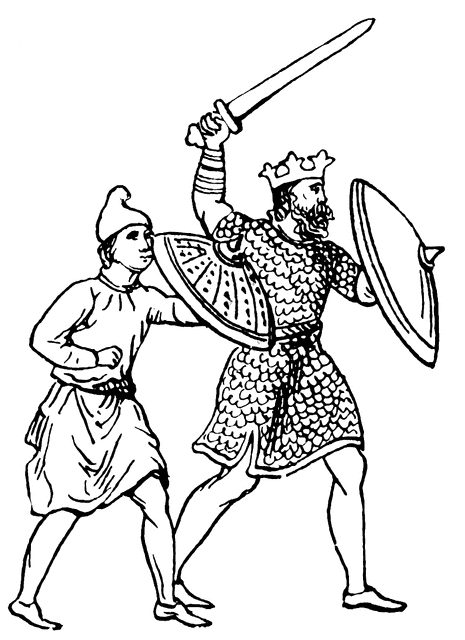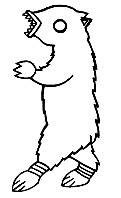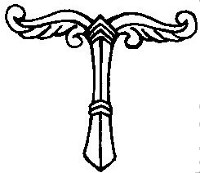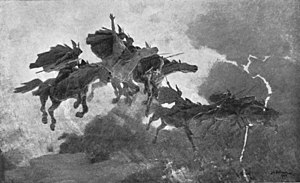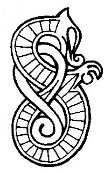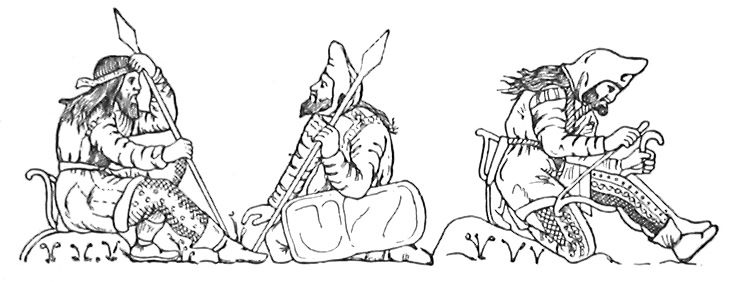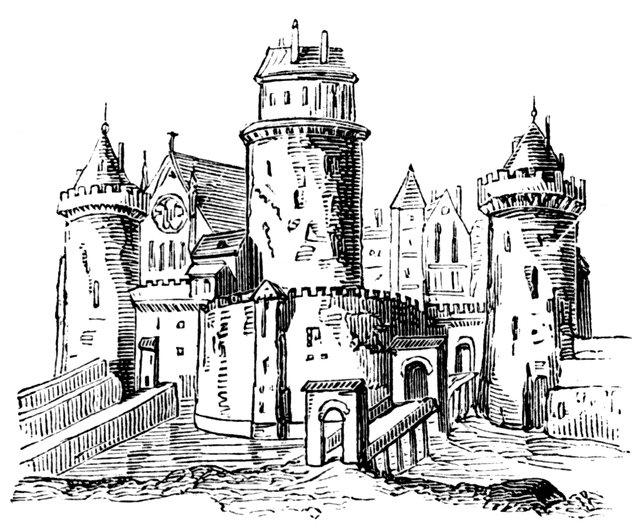Labyrinth Lord Players: The following subtypes are guides to the standard powers of these beings. THis concept is easily converted to Labyrinth Lord rules.
Aesir
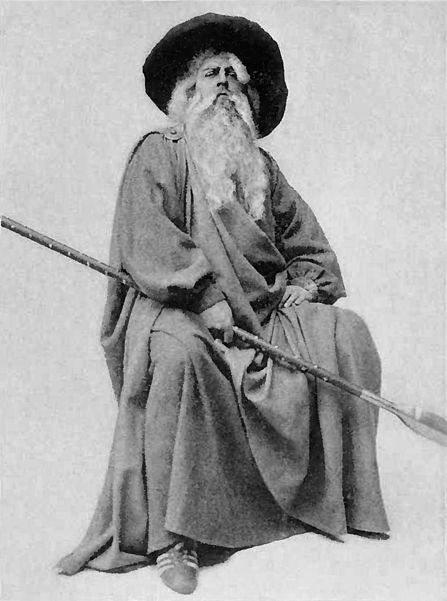 “I know that I hung
“I know that I hung On a wind-rocked tree
Nine whole nights,
With a spear wounded,
And to Odin offered
Myself to myself;
On that tree
Of which no one knows
From what root it springs.”
-Odin’s Rune-Song
Aesir are a race of celestials, native to Asgard. They are a fierce, somber race of beings and are very warlike. They trace their origins to the ancient god buri and his Sturm wife. From his line came Odin, Villi and Ve. Now, the Aesir are ruled by Odin and his wife Frigga.
Aesir resemble men and women of great physical beauty and power. They tend towards a somber demeanor, though this is not always the case. Warfare is foremost in the minds of most of the Aesir, towards which they dedicate their efforts most of the time.
Aesir Traits: An Aesir possesses the following traits (unless otherwise noted in a creature’s entry).
- Darkvision out to 60 feet and low-light vision.
- Aura of Menace (Su): A righteous aura surrounds Aesir that fight or get angry. Any hostile creature within a 20-foot radius of an Aesir must succeed on a Will save to resist its effects. The save DC varies with the type of Aesir, is Charisma-based, and includes a +2 racial bonus. Those who fail take a –2 penalty on attacks, AC, and saves for 24 hours or until they successfully hit the Aesir that generated the aura. A creature that has resisted or broken the effect cannot be affected again by the same Aesir ’s aura for 24 hours.
- Immunity to electricity and petrification.
- +4 racial bonus on saves against poison.
- Human Traits: Gains 1 extra feat at 1 Hit Die, and 4 extra skill points at 1 Hit Die and 1 extra skill point at each additional Hit Die.
- Teleport (Su): Aesir can use greater teleport at will, as the spell (caster level 14th), except that the creature can transport only itself and up to 50 pounds of objects.
- Tongues (Su): All Aesir can speak with any creature that has a language, as though using a tongues spell (caster level 14th). This ability is always active.
Vanir
 “In Gymer’s court I saw her move,
“In Gymer’s court I saw her move,The maid who fires my breast with love;
Her snow-white arms and bosom fair
Shone lovely, kindling sea and air.
Dear is she to my wishes, more
Than e’er was maid to youth before;
But gods and elves, I wot it well,
Forbid that we together dwell.”
-Skirner’s Lay
The Vanir are a tribe of outsiders associated with fertility and prosperity. They live in Vanaheim (Vanaheimr or Vanaland), the world of the Vanir. They warred upon the gloomy and somber Aesir in ages past. The Vanir are gods of joy, air and light, and embody these traits at all times.
Vanir are elf-like, tall, regal and ever-youthful though the very old do grow beards. Many possess great wings and carry an aura of light wherever they go. Laughter and music accompany the vanir.
Vanir Traits: An Vanir possesses the following traits (unless otherwise noted in a creature’s entry).
- Darkvision out to 60 feet and low-light vision.
- Immunity to acid, cold, petrifaction and sleep.
- Resistance to electricity 10 and fire 10.
- +4 racial bonus on saves against poison.
- Protective Aura (Su): Against attacks made or effects created by evil creatures, this ability provides a +4 deflection bonus to AC and a +4 resistance bonus on saving throws to anyone within 20 feet of the Vanir. Otherwise, it functions as a magic circle against evil effect and a lesser globe of invulnerability, both with a radius of 20 feet (caster level equals Vanir’s HD). (The defensive benefits from the circle are not included in an Vanir’s statistics block.)
- Elf Traits: Immunity to sleep spells and effects, and a +2 racial saving throw bonus against enchantment spells or effects. +2 racial bonus on Listen, Search, and Spot checks. A Vanir who merely passes within 5 feet of a secret or concealed door is entitled to a Search check to notice it as if she were actively looking for it.
- Telepathy (Su): All Vanir can communicate telepathically with any creature with 100ft that has a language.
The Jotun
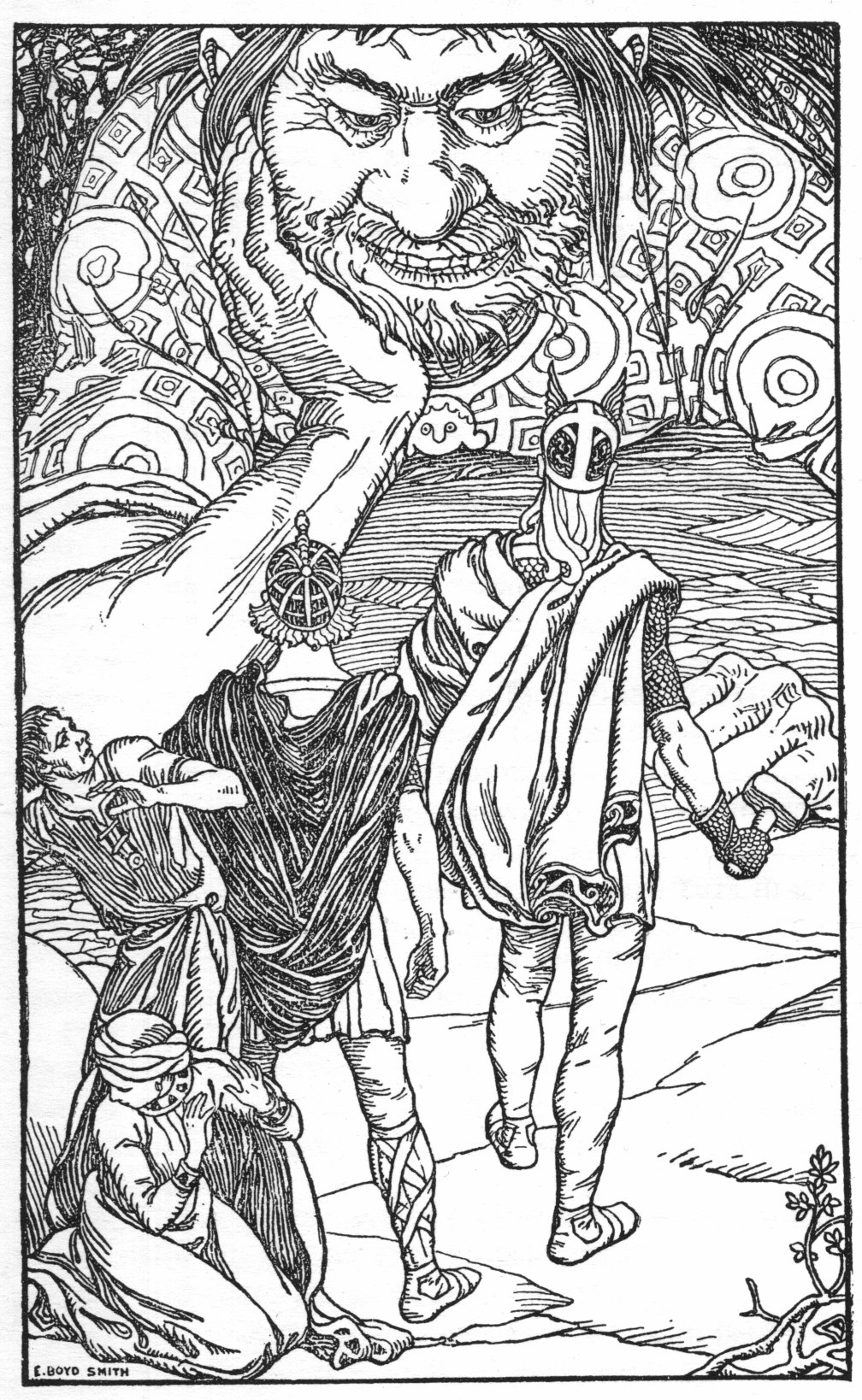 “Not the man of mortal race
“Not the man of mortal raceKnows the words which thou hast spoken
To thy son in days of yore.
I hear the coming tread of death;
He soon shall raze the runic lore,
And knowledge of the rise of gods,
From his ill-fated soul who strove
With Odin’s self the strife of wit,
Wisest of the wise that breathe:
Our stake was life, and thou hast won.”
-Vafthrudni’s-mal
The Jotun are a primordial race of spirits that collectively represent the ferocity and sheer power of nature. As a whole, they are always larger than human-beings, though some are close enough in stature to pass as over-large men and women. All jotun are capricious and temperamental beings, given to deep passions of rage, hate and possessiveness. Some jotun are decent enough beings, but all view humankind as inherently lesser beings and have been known to eat them or kill them for mere idle amusement.
Jotun can live anywhere, from the burning wastes of Muspelheim to the depths of the deepest sea with little difficulty. Jotun live primarily in mountainous Jotunheim, icy Nifleheim and fiery Muspelheim, having their own kingdoms in those worlds. Amongst jotun-kind only those who dwell in Muspelheim have any real organization, with most preferring the way of wild and isolated clans and small kingdoms.
The Nine Worlds does not have giants of the kinds found in the Monstrous Manual such as Hill Giants and Cloud Giants. Rather, this niche is divided amongst the Trolde, Trolde sub-races and the Jotun. Trolde are the only earthy giants of the setting, and are the equivalent of humans or elves to the Aesir or Vanir. Jotun dwell in Jotunheim, Nifleheim and Muspelheim, and are as numerous in those realms as humans are in Midgard. The kingdom of Risaland on Midgard is the largest kingdom of true Jotun near the realms of men.
Jotun Traits: Most Jotun possess the following traits (unless otherwise noted in a creature’s entry).
- Darkvision out to 60 feet and low-light vision.
- Immune to two of the following effects: acid, cold, electricity, fire, poison, petrifaction, or polymorphing.
- Resistance 20 against two of the following effects: acid, cold, electricity, or fire.
- Rock Throwing (Ex): Adult jotun are accomplished rock throwers and receive a +1 racial bonus to attack rolls when throwing rocks. A jotun of at least Large size can hurl rocks weighing 40 to 50 pounds each (Small objects) up to 5 range increments. The size of the range increment varies with the jotun's variety. A Huge giant can hurl rocks of 60 to 80 pounds (Medium-size objects).
- Rock Catching (Ex): A jotun of at least Large size can catch Small, Medium-size, or Large rocks (or projectiles of similar shape). Once per round, a jotun that would normally be hit by a rock can make a Reflex save to catch it as a free action. The DC is 15 for a Small rock, 20 for a Medium-size one, and 25 for a Large one. (If the projectile has a magical bonus to attack, the DC increases by that amount.) The jotun must be ready for and aware of the attack.
- Spells: A Jotun can use arcane spells as a wizard or divine spells as a cleric, from the cleric list and from two domains from the Jotun list. Caster level is equal to the jotun's Hit Dice (maximum 20th level).
- Scent (Ex): Jotun can detect approaching enemies, sniff out hidden foes, and track by sense of smell. Jotun can identify familiar odors just as humans do familiar sights.
- Except where otherwise noted, Jotun speak Giant, Aesir and Vanir.
I will be posting examples of Aesir, Vanir and Jotun very soon. Among these examples will be the Wind Hag (Jotun), True Valkyrie (Aesir) and Gullveig (Vanir).
